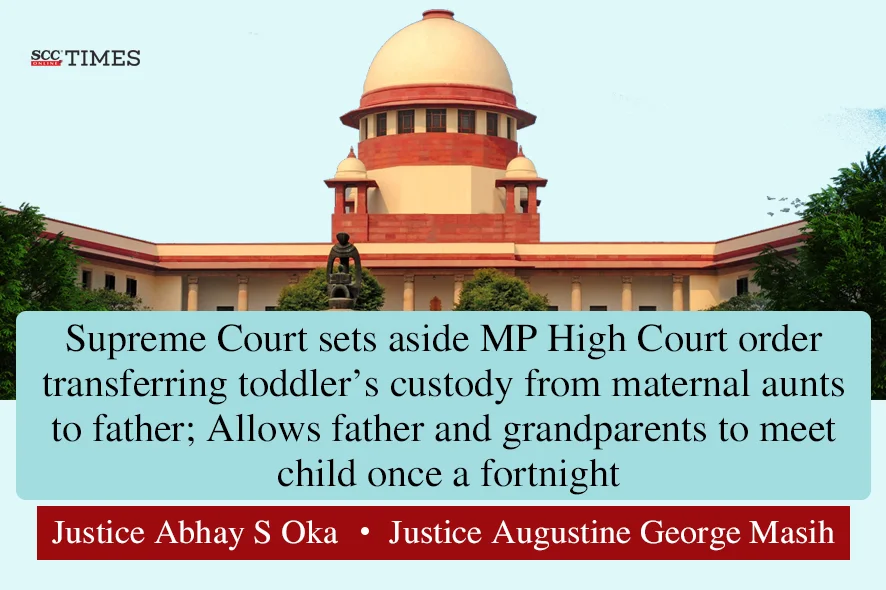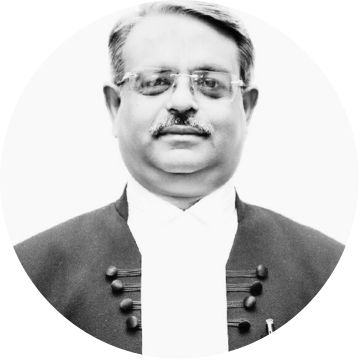Supreme Court: In an appeal against the judgment passed by the Madhya Pradesh High Court, wherein the Court issued writ of habeas corpus directing the aunts to hand over custody of the child (two years and seven months) to the father and his family, the division bench of Abhay S Oka* and Augustine George Masih, JJ. while setting aside the impugned judgment and order, said that the discretion could not have been exercised under Article 226 of the Constitution of India to disturb the custody to the aunts at this stage.
Further, the Court passed the following directions:
-
On every 1st, 3rd and 5th Saturdays starting from 21-09-2024, the aunts were directed to take the child to the office of the secretary of the District Legal Service Authority (‘DLSA’) at district Panna, Madhya Pradesh at 03.00 p.m. Under the supervision of the secretary of the DLSA, the father and grandparents of the child were given permission to meet the child till 05.00 p.m.
-
The secretary of the DLSA was directed to take the assistance of a child psychologist or a psychiatrist (preferably female) working in any local public hospital. If such experts are unavailable, the secretary can privately engage one such expert.
-
The expert so appointed was directed to remain present at the time of access. The expert’s duty will be to persuade the child to interact with her father and grandparents.
-
The aunts were permitted to file a petition seeking a declaration of guardianship and permanent custody of the child under the provisions of the GW Act before the competent Court within a maximum period of two months from the date of this judgment.
Background:
The father and the mother of the child were residing in Indore, where the unnatural death of the mother occurred. A First Information Report (‘FIR’) was registered against the father and his family for offences punishable under Sections 304-B and 498-A of the Penal Code, 1860 and Sections 3 and 4 of the Dowry Prohibition Act, 1961. It was alleged that when the father was busy completing the formalities of the post-mortem, without his consent the sisters of the mother took away the minor child. The father was arrested in connection with the offence on 19-02-2023 and was granted bail after filing the charge sheet on 19-04-2023. The father and his family filed a petition in Madhya Pradesh High Court, seeking a writ of Habeas Corpus under Article 226 of the Constitution of India. The High Court directed the aunts to hand over custody of the child to the father and his family. Aggrieved, the aunts filed the present appeal.
Issue:
Whether the High Court was justified in disturbing the custody of the child, whose age was one year and five months at the time of passing the impugned judgment?
Analysis and Decision:
The Court reiterated that regarding the decision regarding custody of the minor children, the only paramount consideration is the minor’s welfare. The parties’ rights cannot be allowed to override the child’s welfare. This principle also applies to a petition seeking Habeas Corpus concerning a minor.
After perusing the impugned judgment, the Court noted that the High Court has not dealt with and considered the issue of the welfare of the child. The High Court has disturbed the child’s custody based only on the father’s right as a natural guardian.
The Court said that the High Court was dealing with the child’s custody, whose age was one year and five months. The child had been in the custody of the aunts from the tender age of 11 months after her mother died. The child has been in her aunts’ custody for over one and a half years.
The Court remarked that when the Court deals with the issue of Habeas Corpus regarding a minor, the Court cannot treat the child as movable property and transfer custody without even considering the impact of the disturbance of the custody on the child. Such issues cannot be decided mechanically. The Court has to act based on humanitarian considerations. After all, the Court cannot ignore the doctrine of parens patriae.
Thus, considering the peculiar facts of the case and the child’s tender age, the Court said that this is not a case where custody of the child can be disturbed in a petition under Article 226 of the Constitution of India.
The Court emphasized that only in substantive proceedings under the Guardians and Wards Act, 1890 can the appropriate Court decide the issue of child custody and guardianship. Regular Civil/Family Court dealing with child custody cases is in an advantageous position, as:
-
The Court can frequently interact with the child.
-
All Family Courts have a child’s centre/play area.
-
A child can be taken to the play centre, where the judicial officer can interact with the child. Access can be given to the parties to meet the child at the same place.
-
The Court dealing with custody matters can record evidence.
-
The Court can appoint experts to make the psychological assessment of the child.
-
If access is required to be given to one of the parties to meet the child, the Civil Court or Family Court is in a better position to monitor the same.
The Court said that the child has not seen the father and grandparents for over a year. At the tender age of two years and seven months, if custody of the child is immediately transferred to the father and grandparents, the child will become miserable as the child has not seen them for a considerably long time.
The Court stated that whether the father is entitled to custody or not is a matter to be decided by a competent court, however, during this time he is entitled to have access to meet the child.
The Court noted that the father has shown unwillingness to apply for custody, therefore, the Court permitted the aunts to apply for custody to the Regular Court under the GW Act.
Further, the Court directed the aunts to give access to the father and paternal grandparents of the child to meet the child once a fortnight. Access to be provided in the office of the secretary of the District Legal Service Authority so that the secretary can supervise access.
Thus, the Court directed the secretary of the District Legal Service Authority to take assistance from a child psychologist or a psychiatrist (preferably female) attached to a local public hospital. If no such expert is available with the local public hospital, to ensure that the child responds to the father and grandparents and interacts with them.
The Court clarified that the order of access to continue for four months. After that, the Trial Court can modify this order of access in all respects. The Court further said that when the child becomes comfortable with his father and grandparents, the Court can also consider granting overnight access to the father and the grandparents.
CASE DETAILS
|
Citation: Appellants : Respondents : |
Advocates who appeared in this case For Petitioner(s): For Respondent(s): |
CORAM :









